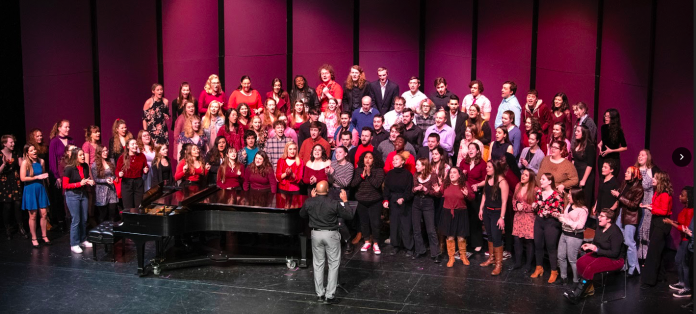In continuation of a diverse series of events in commemoration of the work of African American composers and poets, the music department hosted an engaging presentation in the CA’s Empie theatre on Wednesday, Feb. 12. The event was a student-to-student conversation about the cultural significance of under-appreciated music in classical canon written by African American composers and poets.
Ted Conner, professor of music, gave a few opening remarks before handing the morning over to a group of cognitively and musically gifted students. They were divided into groups of two, where one member explained the history of a song’s lyrics and the life and career of the poet behind them, and the other gave the audience insight into the language of the piece’s musical structure and what that says about the correlation between the poet’s words and their passions.
The first speaker was Arianna Tilley ’22, a sophomore dance and theatre major who spoke about the notable African American writer Paul Dunbar. Tilley explained that Dunbar was heavily influenced by the teachings of his parents, and they were often the subject of his work. She explained that Dunbar’s writing career began as early as elementary school, where he was the only student of color, and took off when he reached high school, where he joined his school newspaper and decided that he wanted to pursue a career in journalism. Though he worked as an elevator operator, he wrote in his free time, and even gained support from such a notable figure as Frederick Douglass.
Following the engaging discussion, Valentina Nazzaro ’22 sang a soaring rendition of “Beside the Sea” by Florence Price. Nazzaro explained that Price was a music prodigy from a young age, beginning on her first composition at eleven years old. “Price had a clear interest in music, and decided to pursue it at the New England Conservatory of Music,” Nazzaro told the crowd. “The crazy part was that she had to lie about her heritage in order to obtain the education she wanted.”
Other presenters involved in the event floored the audience of high school students, community members and Muhlenberg faculty and students with remarkable musical abilities and fonts of passionate knowledge. Molly McCarthy ’22 and Celeste Samson ’22 explored Georgia Douglas Johnson, an Oberlin graduate and literary pioneer who wrote The Heart of a Woman, a text which gave way to H. Leslie Adams’s groundbreaking song cycle, The Wider View. The song cycle covered a unique style, containing aspects of jazz and Black folk music in the composition.
Alice Banta ’21 and Zaire Carter ’22 continued the discussion by guiding the conversation toward an African American civil rights figure who had made his way into the limelight and left his mark on the American people as an activist and a noble martyr in the struggle for racial equality: Dr. Martin Luther King, Jr.
Carter was enthusiastic in his description of Dr. King’s life and legacy, and dove deeper than what is normally deemed common knowledge about his cumulative impact. He explained that, after Dr. King earned his sociology degree, he joined the seminary, and began his journey to use Christianity to spread awareness about his culture and the position he wished his brothers and sisters would attain in a society that constitutionally accepted them. Carter ended his speech with a powerful statement:
“People say that knowledge is power, and it depends on what you do with it that defines the kind of person you will be.”
Following this compelling lecture, Banta sang a gorgeous, dreamlike composition by Adolphus Hailstork. She had staff accompanist Vincent Trovato demonstrate different measures in the music for the audience in an effort to visually and aurally compare the musical motifs in Hailstork’s music with the ideals of Dr. King.
Two days later, the music department hosted a similar cultural event in the Empie Theatre, this time featuring Muhlenberg’s College Choir, directed by assistant professor of Music, Christopher Jackson, and the Gospel Choir, directed by Eric Thompson ’10, assistant director of admissions. The two groups performed separately, performing such pieces as “To Sit and Dream”, featuring text from a Langston Hughes poem, and choosing repertoire that accurately reflected the reverence that the music department has for classical composers and poets of color. At the end of the performance, the two groups sang one final piece together, a catchy gospel tune by the name of “Woke Up This Mornin’.” Thompson preceded the performance by explaining that this would be a secular rendition of the piece, edited for a choir of various beliefs and backgrounds.
The most impressive aspect of this endeavor by the Muhlenberg Music Department was the inclination towards inclusivity and a cognitive music education based on tenets of global unity. It seems fitting to conclude that from the various performances, it could be deduced that the college community is more apt than ever to learn about music from beyond the famed composers of the accepted canon, and look past this miniscule subset of classical music to explore and enjoy all that the music world has to offer.
Danny Milkis '23 is a Media & Communication student at Muhlenberg who has a specific interest in writing and journalism. In high school, he took part in extracurricular writing whenever possible, and received a Metropolitan Award nomination for his work as a Student Performing Arts Critic. He is ecstatic to have joined the staff of talented writers and editors at the Muhlenberg Weekly, and is excited to learn from this wonderful group of knowledgeable individuals throughout his time at Muhlenberg.






















